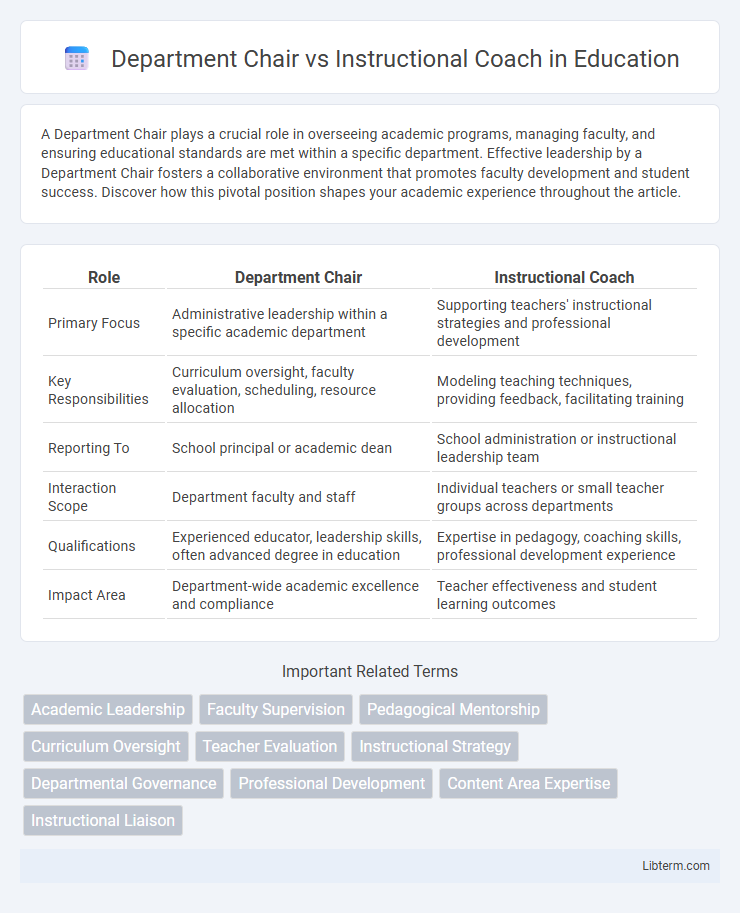A Department Chair plays a crucial role in overseeing academic programs, managing faculty, and ensuring educational standards are met within a specific department. Effective leadership by a Department Chair fosters a collaborative environment that promotes faculty development and student success. Discover how this pivotal position shapes your academic experience throughout the article.
Table of Comparison
| Role | Department Chair | Instructional Coach |
|---|---|---|
| Primary Focus | Administrative leadership within a specific academic department | Supporting teachers' instructional strategies and professional development |
| Key Responsibilities | Curriculum oversight, faculty evaluation, scheduling, resource allocation | Modeling teaching techniques, providing feedback, facilitating training |
| Reporting To | School principal or academic dean | School administration or instructional leadership team |
| Interaction Scope | Department faculty and staff | Individual teachers or small teacher groups across departments |
| Qualifications | Experienced educator, leadership skills, often advanced degree in education | Expertise in pedagogy, coaching skills, professional development experience |
| Impact Area | Department-wide academic excellence and compliance | Teacher effectiveness and student learning outcomes |
Overview: Department Chair vs Instructional Coach
A Department Chair typically oversees the administrative and operational functions of an academic department, including curriculum development, faculty coordination, and policy implementation. An Instructional Coach concentrates on improving teaching practices by providing personalized support, professional development, and feedback to educators. While the Department Chair manages broader departmental goals and leadership, the Instructional Coach focuses on enhancing instructional quality and student learning outcomes.
Key Roles and Responsibilities
The Department Chair oversees curriculum development, faculty evaluation, and budget management, ensuring alignment with school goals and academic standards. Instructional Coaches focus on improving teaching strategies by providing personalized support, professional development, and feedback to enhance instructional quality and student outcomes. Both roles aim to foster academic excellence but differ in scope, with Chairs managing administrative duties and Coaches specializing in instructional improvement.
Leadership and Influence in Schools
Department Chairs lead academic teams by setting curriculum standards, coordinating professional development, and managing departmental resources, thus directly influencing instructional quality and student achievement. Instructional Coaches focus on personalized teacher support, modeling effective teaching strategies, and fostering reflective practice to enhance classroom instruction and student outcomes. Both roles drive school leadership and instructional improvement, but Department Chairs have broader administrative responsibilities while Instructional Coaches emphasize hands-on pedagogical mentorship.
Focus Areas: Curriculum vs Instruction
Department Chairs primarily concentrate on curriculum development, ensuring alignment with academic standards, program goals, and assessment strategies. Instructional Coaches focus on enhancing instructional practices by supporting teachers with pedagogy, classroom management, and differentiated instruction techniques. These distinct focus areas facilitate improved student outcomes through curriculum coherence and effective teaching methodologies.
Collaboration with Faculty and Staff
Department Chairs lead faculty by coordinating curriculum development, facilitating meetings, and managing departmental resources to ensure alignment with institutional goals. Instructional Coaches collaborate directly with teachers by providing personalized feedback, modeling instructional strategies, and supporting professional growth to enhance classroom effectiveness. Both roles foster a collaborative culture, but Department Chairs emphasize administrative leadership while Instructional Coaches focus on instructional improvement.
Professional Development Duties
Department Chairs oversee curriculum alignment, facilitate faculty meetings, and coordinate professional development initiatives to ensure subject-area consistency. Instructional Coaches provide personalized, classroom-based support by modeling teaching strategies, analyzing instructional practices, and delivering targeted training tailored to individual educator needs. Both roles drive professional growth, but Department Chairs emphasize administrative leadership while Instructional Coaches focus on hands-on, instructional improvement.
Decision-Making and Authority
A Department Chair holds formal decision-making authority over curriculum development, faculty evaluations, and resource allocation within the academic department, often operating with administrative backing from the school leadership. An Instructional Coach primarily influences teaching practices and instructional strategies through advisory and supportive roles, without direct authoritative control over policy or personnel decisions. The Department Chair's role entails hierarchical leadership responsibilities, whereas the Instructional Coach functions as a peer collaborator focused on professional development.
Impact on Student Outcomes
Department Chairs influence student outcomes by setting academic standards, overseeing curriculum alignment, and supporting teacher development within their specific subject areas, which ensures consistent instructional quality. Instructional Coaches directly impact student achievement by providing personalized teacher support, modeling effective teaching strategies, and analyzing student data to tailor instruction. Both roles contribute to improved learning, but Instructional Coaches tend to have a more immediate and classroom-focused effect on student performance.
Required Skills and Qualifications
Department Chairs require strong leadership skills, curriculum development expertise, and experience in academic administration to manage faculty and oversee educational standards effectively. Instructional Coaches need in-depth knowledge of instructional strategies, data analysis skills to assess student performance, and the ability to provide personalized teacher support for improving classroom practices. Both roles demand excellent communication abilities and a solid understanding of educational pedagogy, but Department Chairs emphasize organizational management, while Instructional Coaches focus on instructional improvement.
Career Pathways and Advancement
Department Chairs typically advance through academic ranks, leveraging leadership experience to potentially move into administrative roles such as Dean or Academic Director, while Instructional Coaches often progress by deepening pedagogical expertise and expanding responsibilities into curriculum development or district-level instructional leadership. Career pathways for Department Chairs emphasize management skills, faculty supervision, and strategic planning, whereas Instructional Coaches focus on teacher mentorship, professional development, and data-driven instructional improvement. Advancement for Department Chairs involves navigating institutional governance structures, but Instructional Coaches may transition into roles like Director of Professional Learning or Education Consultant.
Department Chair Infographic

 libterm.com
libterm.com